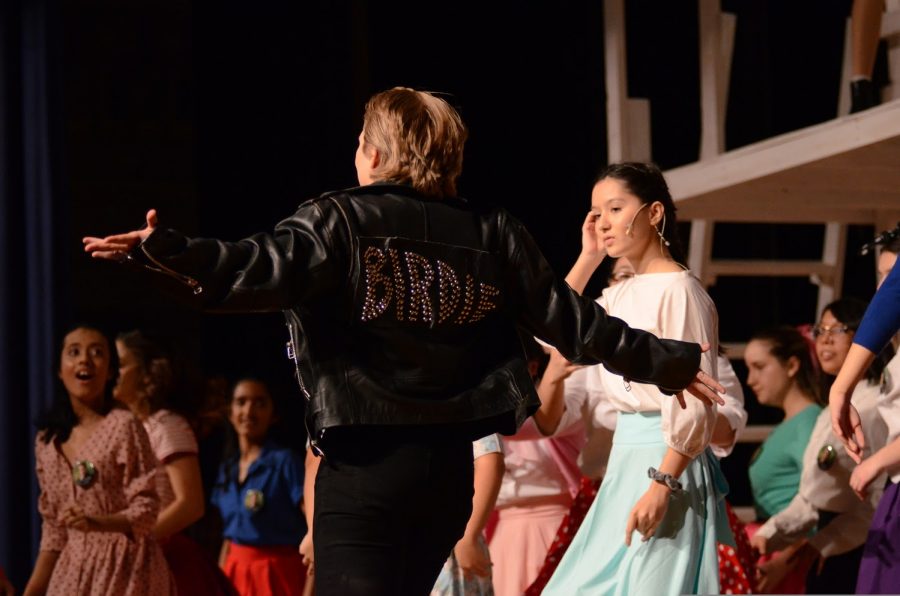An Honestly Sincere Review of Bronx Science’s Bye Bye Birdie
Originally made to critique the rise of Rock ‘N’ Roll, Conrad Birdie, played by Spencer McQuaig ’20 in Cast B, makes both the Birdie Fan Club and audience swoon with a cool-guy attitude, bedazzled costumes, and amazing voice.
For the Drama Department, there were several sweeping changes made within the running of the musical this year. Amongst the greatest changes were the retirement of beloved Drama Advisor Mr. Brown and the moving of the musical from the springtime, where it has been for over four years, to the fall.
But despite these changes since their production of Into the Woods last May, the Bronx Science Drama Department kept pushing through. The department’s production of Bye Bye Birdie made for an overall fun and enjoyable viewing. However, although both casts were entertaining, there were a few legitimate issues in the production.
The show opens with Albert Peterson, played by Owen Tumer ’20 in Cast A and Nolan Caile ’21 in Cast B, and Rose Alvarez, played by Jean Namgung ’20 in Cast A and Amanda Caress ’20 in Cast B.
For those who saw both Cast A and Cast B, the opening scene established the major differences between them. In Cast A’s blocking of the scene, where Albert went to the piano and attempted to compose a new song while joking around with Rosie, we see bubbling personalities and memorable moments between Albert and Rosie as a couple. To be honest, I don’t remember much of the same scene with Cast B.
I believe that the double cast system is ultimately my largest problem with this production. This system was unnecessary and led to the production feeling like two parallel but completely different shows. If the cast and crew only had to worry about one show, then the show would have been as strong or stronger with half the stress.
In spite of the significant disadvantages of this system, members of the cast and crew worked overtime and were able to deliver on very important fronts. When the curtains open after that first scene the audience finally sees the daunting white platforms and colorful backdrop. Once the ensemble has fully filed on stage throughout the number, the spectacular costumes are in full view. The Costume Directors Felicia Chen ’20 and Margaret Monahan ’21 leaned into the 60s aesthetic and made sure that, despite the rather bare-bones set, the audience would know exactly when this show takes place. This was an especially amazing feat, considering that they needed to keep track of twice the amount of costumes this year.
Other notable successes of the school’s production include their ensemble numbers, which were some of the most entertaining sequences I have ever watched in a school musical. “The Telephone Hour,” “Healthy Normal American Boy,” and “Honestly Sincere” were my favorites. The choreography, credited to Marcus S. Daniel (a new face in the Drama Department staff), was energized and inspired, leaving me excited for the next step.
But then our next main character is introduced. Kim MacAfee, played by Chloe Schamisso ’21 in Cast A and Bailey Stephen ’21 in Cast B, is a child who wants to be treated like a woman. Kim, her younger sister Randi, and her parents Harry and Doris are meant to represent the average, ideal family. However, we see that there are major imbalances of power in the household, with the patriarch Harry MacAfee, played by Logan Droege ’21 in Cast A and Zachary Karlin ’21 in Cast B, often resorting to unbridled rants of rage towards his children and wife. But I think my issues with this come with the actual choice of this show.
Bye Bye Birdie is a relic of an older time. Of course, this led to the very upbeat and lively ensemble numbers, especially with the Elvis Presley-inspired Conrad Birdie, played by Babou Gaye ’20 in Cast A and Spencer McQuaig ’20 in Cast B. But this show portrayed some particularly troubling themes. Kim’s few songs, namely “How Lovely to Be a Woman” and “One Boy,” promote the idea that women are only meant to be defined in relation to men.
Although Schamisso and Stephen’s voices were angelic, lines like “Whenever you hear boys whistle/ You’re what they’re whistling at” and “How lovely to be a woman/ And have one job to do/ To pick out a boy” took me out of the show completely. And it isn’t as though these were just some throwaway lines left from an aged musical. The ending of the show, in which Kim and Hugo are revealed to be engaged, completely justifies and rewards this thinking. There is no universe in which two fifteen-year-olds getting engaged should be treated as a fairytale ending.
Don’t worry, if you don’t remember two major characters getting engaged, it’s because it happened in a few throwaway lines near the finale of the show.
The cutting and replacement of lines wasn’t a stranger to this production, with the song “Spanish Rose” being cut from the show entirely, which was originally meant for Rosie to make fun of Albert’s mother’s racist comments towards her. Even after cutting songs and lines, if you still can’t rid a show of outdated and uncomfortable messages, then perhaps you should either choose a different show or actively work to critique and satirize it.
No matter my feelings on the source material, it was clear how much time and energy was put into this production. Everyone I know in the department, cast and crew alike, are passionate about what they do and worked tirelessly to create the best product that they could. And the Bronx Science Drama Department’s production of Bye Bye Birdie was indeed a show to be proud of.
The Bronx Science Drama Department’s production of Bye Bye Birdie was indeed a show to be proud of.
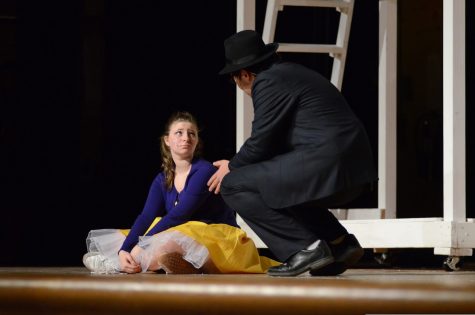
Upset about Conrad Birdie being drafted into the army, Alice, played by Julia Gallent ’22 in Cast B, pouts despite Albert Peterson’s pleas. Peterson was played by Nolan Caile ’21 in Cast B. He attempts to cheer her up with an elaborate tap sequence and good-natured singing.
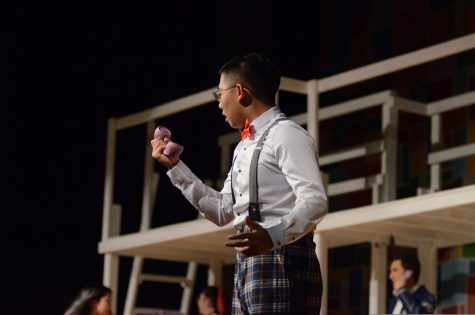
With the buzz of Kim and Hugo’s relationship flooding all the lines, Harvey Johnson, played by Brian Tong in both casts, makes his final attempts to try and get a date to the prom in Telephone Hour. The choreography and costumes bring the small town to life in this stand out number.
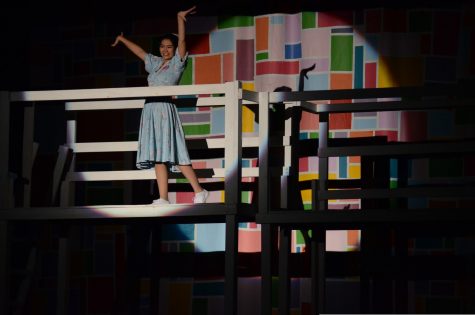
After hearing all about her in Telephone Hour, Kim MacAfee, played by Chloe Schamisso in Cast A, sings about her coming of age in ‘How Lovely to be a Woman.’ As her voice graciously soars into the heavens, the audience is left as smitten as Hugo Peabody.
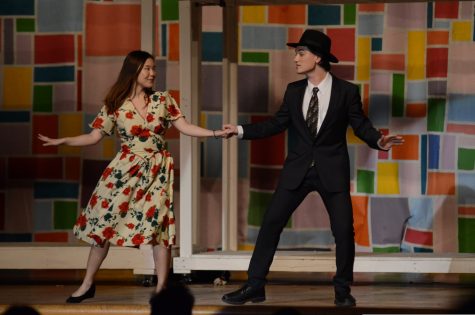
The relationship between Albert and Rosie, played by Owen Tumer and Jean Namgung in Cast A, felt real, leaving the audience invested in what happens. The final song, ‘Rosie,’ was a sweet and satisfying conclusion to the musical.
Jing Mae Wang is a Copy Chief Editor for ‘The Science Survey’ and an Academics Section Reporter for ‘The Observatory.’ The students of Bronx Science...
Jillian Chong is an Editor-in-Chief for ‘The Science Survey.’ As a journalist, she loves that she has the ability to voice her opinions and inform...

